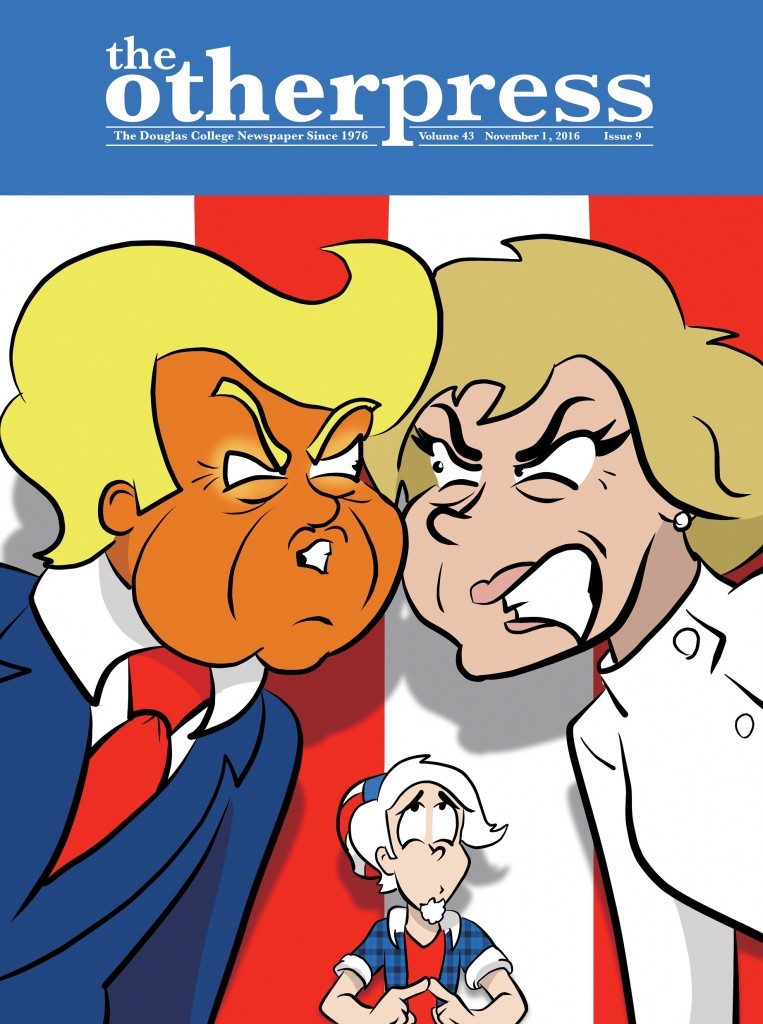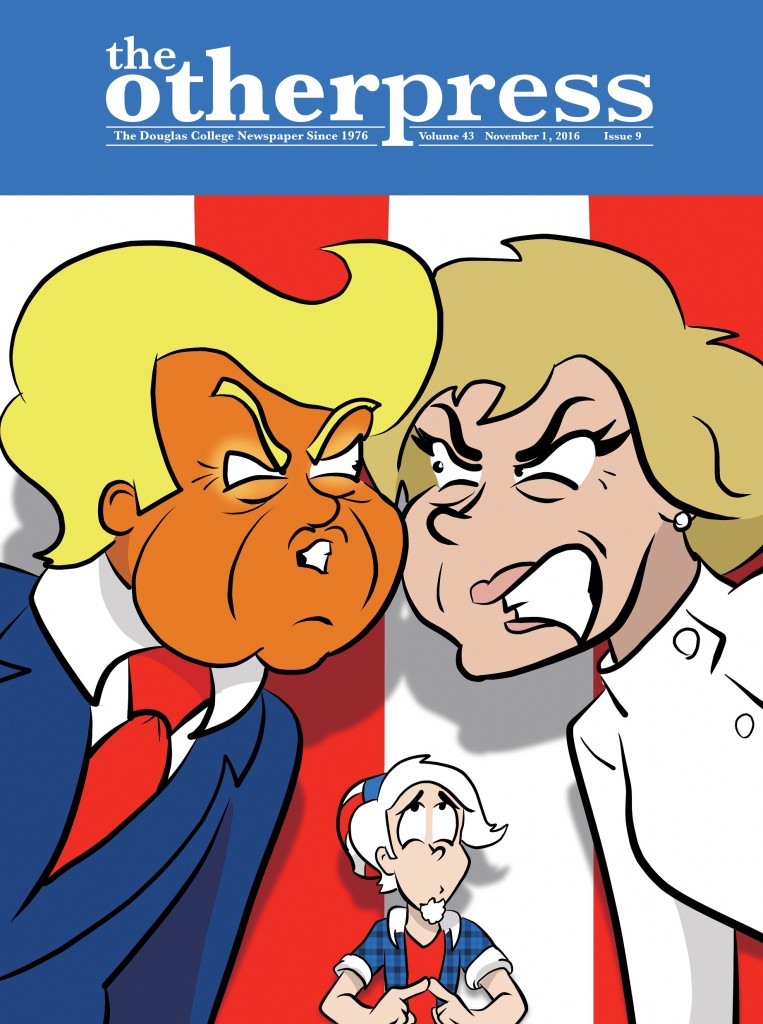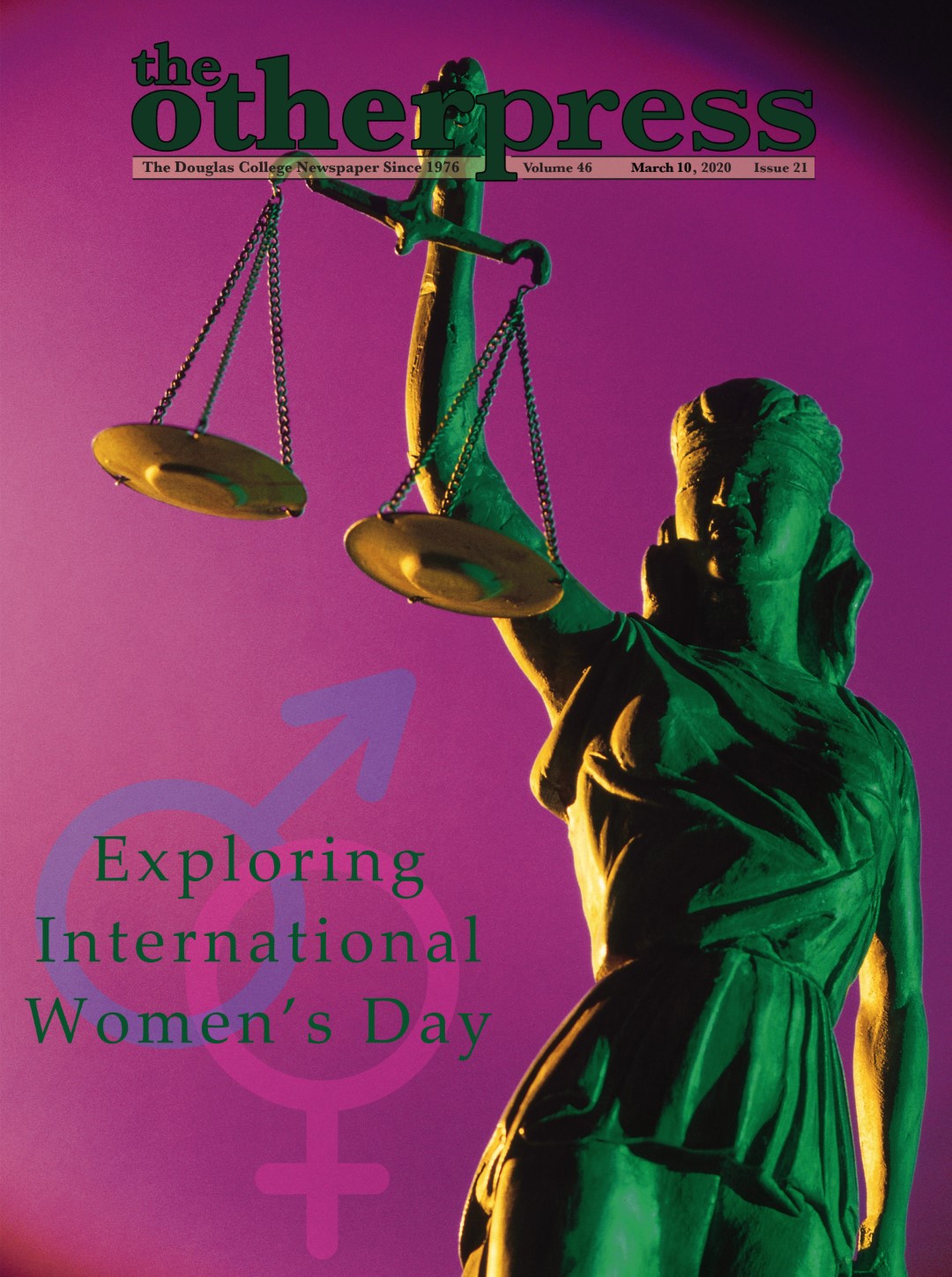 Or: How did we get here?
Or: How did we get here?
By Cazzy Lewchuk, Opinions Editor
By the time you read this, the United States of America will be less than a week away from choosing the next President. The major nominees are Hillary Rodham Clinton and Donald J. Trump. This election has been unprecedented in its magnitude, controversy, and history, particularly in Trump’s candidacy. Everyone’s got an opinion, and everyone hates one candidate a little less than the other. Here, we take you through who these candidates really are, and what their plan is to either Make America Great Again, or simply keep it great.
Donald J. Trump
Officially, the election began on March 23, 2015 when Texas Senator Ted Cruz announced his candidacy. Along with Trump, 14 other candidates were in the running. After massive primary losses, Cruz dropped his candidacy on May 4, 2016. Although clashing with and distrusting Trump, he eventually endorsed him and now campaigns on his behalf.
Unlike most presidential candidates, Trump does not come from a background of public service or politics. He was born in Queens in 1946 to a wealthy real estate family. He graduated with a degree in economics, avoiding the Vietnam War draft through student and health deferments.
Trump spent the next several decades continuing his father’s real estate business. He quickly became one of the US’s most recognizable obnoxiously rich businessmen. His celebrity was further enhanced by TV cameos and hosting NBC’s The Apprentice and spin-off Celebrity Apprentice.
Although Trump has never before held political office, he has held political positions and campaigned several times. He ran an unsuccessful campaign in 1999 for the Republican nomination, but became a Democrat from 2001–08. He hinted at running again in 2012, although later decided not to. Trump was an originator of the “birther” movement, first suggesting in 2011 that Barack Obama was not born in the US and thus ineligible for the presidency. Despite repeated displays of Obama’s birth certificate, Trump did not formally agree on his birthplace until September 2016.
Although a large part of his campaign has been about embracing a lack of political correctness and saying what’s on his mind, Trump’s statements have caused significant opposition, even from within his own party. In fact, perhaps no presidential nominee in modern US history has ever been more controversial than Donald Trump. His personal gaffes, quotes, and image have caused even more controversy than his extreme positions. To detail the many controversies he’s been involved with would take up space we don’t have room for here, but they include perceived racist comments towards Latinos, Muslims, and African-Americans; praising the styles of Saddam Hussein, Vladimir Putin, and Kim Jong-un; perpetuating false conspiracy theories against Clinton, the “biased media,” and the political process; seemingly encouraging an increase in nuclear war weapons and tensions; and the leaked tapes detailing him bragging of sexual assault.
In this 2005 video released by the Washington Post on October 7, Trump claimed to automatically start kissing women he found attractive, and that “when you’re a star, they let you do it […] Grab them by the pussy.” The release prompted a massive public condemnation, with many Republicans withdrawing support from Trump. In response, Trump argued that such statements were merely “locker room talk” and that “nobody has more respect for women than I do.” He also pointed out Bill Clinton’s own accusations of sexual assault and Hillary’s alleged defence of his actions. Despite Trump’s denials of any wrongdoing, 13 women have accused him of groping or otherwise inappropriately touching them since the release. He has continued to deny the allegations and threatened to sue his accusers.
At this point, Trump is widely expected to lose the election. As of October 29, polls give Clinton an 81.5 per cent chance of winning the presidency. For many, the question is not whether he’ll lose, but by how much, and what the aftermath will be. Trump himself has suggested election results could be rigged due to voter fraud, an issue widely regarded to have never been impactful in voting results. He stunned audiences with the declaration that he would “keep you all in suspense” when asked if he would accept the election results, later declaring he would be accepting “if I win.”
Trump’s stance on immigration has been a significant factor in his popularity and infamy. Perhaps his most unusual stance is pledging to build a physical wall on the US-Mexico border, which he claims the Mexican government will pay for. Trump has also pledged heightened enforcement of current immigration laws. One of his earliest pledges was to put a temporary ban on Muslims entering the US in response to terrorism threats. This was later expanded to become a blanket ban on migrants from any country significantly affected by terrorism, although he has sometimes claimed there would be exceptions.
Trump’s major platforms include a plan to create 25 million jobs over the next decade, primarily through “America First” economic policies, which involves cracking down on immigrants and a free-market economy style featuring even less corporate and tax regulation than what is currently allocated.
Other factors of a supposed Trump loss include the further division of the Republican Party, perhaps even leading to a total breakup. Already distrusting most media networks, Trump has hinted at his own channel, “Trump TV.” However, it remains unclear how many would be interested in his personal brand following a loss. The Trump brand has already taken a significant loss in business due to his campaign.
Hillary Rodham Clinton
In contrast to the multiple Republican candidates, there were only two Democrat contenders by the end of the first primary: formerly Independent Vermont Senator Bernie Sanders and former Secretary of State Hillary Clinton.
Bernie Sanders ran on a platform of criticizing unrestricted banks, the Wall Street agenda, and the resulting system hurting the poor in America. Despite his underdog status, Sanders went on to win 23 primaries and 43.1 per cent of the popular vote. Many Americans (and international observers) were disillusioned by Sanders’ loss and blamed a corrupt party system. Leaked documents showed the party to have a significant bias against Sanders. Despite losing, his candidacy resulted in a strong influence that led to a much more progressive agenda for Clinton and the Democrats. He continues to campaign for Clinton/against Trump and has returned to work as an Independent Senator, continuing his perceived revolution.
Born in Chicago in 1947, Hillary Rodham (as she was then known) has been volunteering for political campaigns since the 1960s. After graduating from law school, she first entered politics when her husband Bill was elected Governor of Arkansas in 1978. She was eventually thrust into the public’s eye when her husband was elected president in 1992, and was First Lady of the United States until 2001. Unlike most First Ladies, Clinton took an active role in determining her husband’s Cabinet and policies. She was widely regarded for her activism and administration role, as well as her handling and forgiveness of Bill’s affair while in office.
After leaving the White House, Clinton was elected Senator of New York in 2001. As expected, Hillary launched a bid for the presidential nomination in 2008. Despite performing well in the primaries, she lost to Barack Obama—who subsequently made her Secretary of State, a position she held until 2013.
From 2013 to April 2015, Clinton ran the non-profit corporate charity The Clinton Foundation along with her husband and daughter. The foundation has raised over $2 billion from a variety of donors, including international governments, and works to strengthen citizen aid and empowerment around the world. Hillary also worked by giving speeches, both paid (roughly $200,000 per appearance) and unpaid, including some to large corporations and Wall Street. As was widely anticipated, Clinton officially declared her candidacy on April 12, 2015, and subsequently resigned from The Clinton Foundation.
Clinton’s controversies include the unrestricted donations taken for her foundation, high-priced speeches paid for by the 1 per cent, and most famously, her usage of a private email server in her home during her term as Secretary of State. Over 31,000 emails were deleted, of which 113 were found to contain classified information. She was later investigated by the FBI, who declared on July 6 that, although she had used poor judgement, no charges would be laid. Despite the clearance, the email controversy remains an argument used by her opponents, including many liberals, as an example of her untrustworthiness. However, the FBI has just announced another probe into newly discovered Clinton emails, which could affect her numbers going into the final week.
Many of Clinton’s positions are due to Sanders’ influence. Her platform includes making public college free for families earning under $125,000 a year, capping childcare expenses at 10 per cent of a family’s income, and a $15 minimum wage. Well-known for her progressive past and political pragmatism, she is often criticized for embodying systematic politics. Nevertheless, her policies are a sharp contrast to Trump’s and significantly less threatening to minorities.
The third parties/other opponents
As with every election, various third party or independent candidates will also have their names on the ballots. Libertarian Party nominee Gary Johnson appears in all 50 states, as well as the District of Columbia; Green Party nominee Jill Stein appears on 45, including DC. With the unpopularity of both major party candidates, third-parties are expected to receive more votes than in a typical election. It is unlikely that either candidate will receive an electoral vote, meaning that their ultimate influence on the outcome of the election will be minimal at best.
Independent conservative candidate Evan McMullin is polling at 28 per cent in Utah, tying with Clinton and 7 points behind Trump. It is possible that McMullin will win Utah’s six electoral votes, which could throw the election to Clinton or Trump in the event of a close race.
Ultimately, we are looking at a President Trump or another President Clinton. One has been politically active and preparing for the role her entire life, while the other has used his aggression and outsider status to fuel a campaign unlike anything ever seen before. The controversy and disappointment involved with this election may lead to record low—or perhaps extremely high—turnout. Ultimately, most Americans want the same thing: personal and national success, with effective solutions to major issues facing their society. Only time will tell how Clinton and Trump will succeed and be remembered by history.



